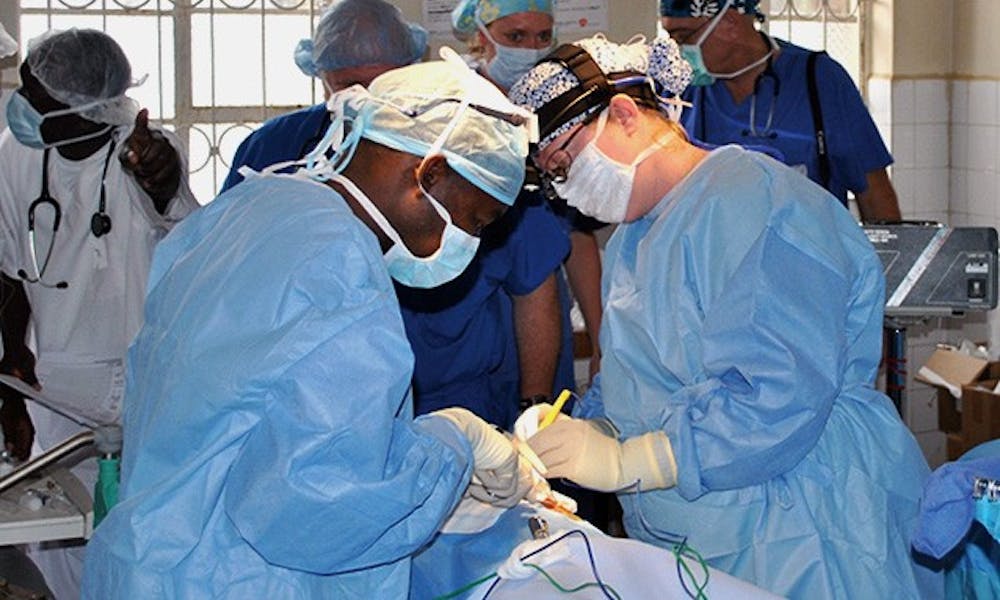A Duke medical team is aiming to improve health care in Africa.
Dr. Michael Haglund, a professor of neurosurgery at the School of Medicine, led a team of 16 medical professionals—composed of neurosurgeons, anesthesiologists, intensive care unit nurses, radiographers and other specialists from Duke and the Triangle—on a medical trip to Kenya Sept 2-11. The trip marked his sixth expedition to Africa with a medical team.
The team conducted operations on 25 patients in collaboration with the Moi Teaching and Referral Hospital in Eldoret, Kenya, with the goal of strengthening health systems in the country.
“[By traveling there] I had a better feel for the number of surgeons and the amount of medical equipment needed [for the hospital],” Haglund added.
The team selected a patient group with different brain and spinal conditions to demonstrate a variety of complex medical practices to 16 Kenyan neurosurgeons in training. The team transferred useful skills to local nurses and surgeons.
“We were basically passing on tricks—the way we do things in the States,” Haglund explained.
The medical operations were successful, Haglund noted. He performed surgery on one man who had an arrow penetrating four inches deep into his skull. After the surgery, the patient was still in critical condition, but he had a better chance to survive.
The lack of technology often prevents an earlier diagnosis for many African patients.
For example, one patient had a tumor about the size of a “softball,” Haglund said.
In another case, a young girl had a pair of scissors lodged in her spinal cord. She recovered and left the hospital two days after the surgery.
Though two-thirds of the members had gone on medical trips to Africa multiple times, the rest the experience—both culturally and professionally—was very different from what they had encountered at home, Haglund said.
“It’s fun to watch the eyes of the rookies when they see everything for the first time, and then we have the veterans to make sure everything goes well,” Haglund said.
The difference also exposes one of the most fundamental problems in African countries—a shortage of medical equipment, specialists and financial resources—that brought the medical team from North Carolina.
In Uganda and Rwanda, there is one neurosurgeon for every five million people, Haglund noted. In comparison, the U.S. has one per every 75,000 people. Dr. Florentius Koech, who worked with Haglund, is the only neurosurgeon in western Kenya and one of only 12 in the entire country.
“There was no [modern] technology so they were doing things we used to do in the 1930s at Duke. They would use a hand drill to open the skull, like one of those wood shop drills,” Haglund explained. “In the U.S. we use nitrogen-powered high-speed drills.”
The team raised $150,000 to cover its expenses for the past two trips to Africa. Aside from the support of the Duke Global Health Institute, donations from Haglund’s patients in the U.S. covered 10 percent of the trip’s cost.
This entire trip contributes to the mission of DGHI, which aims to address health disparities around the world, said Dr. Michael Merson, founding director of the DGHI and the vice president and vice provost for Global Strategy and Programs.
After his previous medical trips to Rwanda and Uganda, Haglund helped initiate Duke Global Health Placement of Life-changing Usable Surplus, a program now administered through the Duke Global Health Institute, that delivers medical equipment to developing countries.
“We get the new fancy things here,” Haglund said. “Rather than giving equipment away to liquidators for pennies on the dollar we give it to faculty for projects around the world. ”
In total, Haglund delivered 25 tons of medical equipment, worth $5 million, to hospitals in Uganda.
Dr. Victor Dzau, chancellor for health affairs and president and CEO of the Duke University Health System, commended the success of this trip.
“Patients are being helped—even saving one life makes a difference in the world,” Dzau said. “It provides staff an opportunity to express their compassion and to work together as a team.”
Julian Spector contributed reporting.
Get The Chronicle straight to your inbox
Signup for our weekly newsletter. Cancel at any time.

